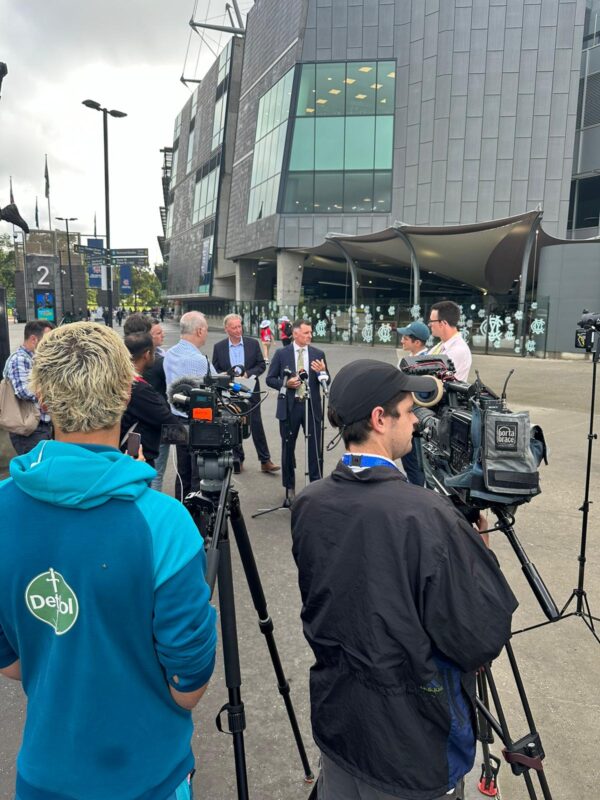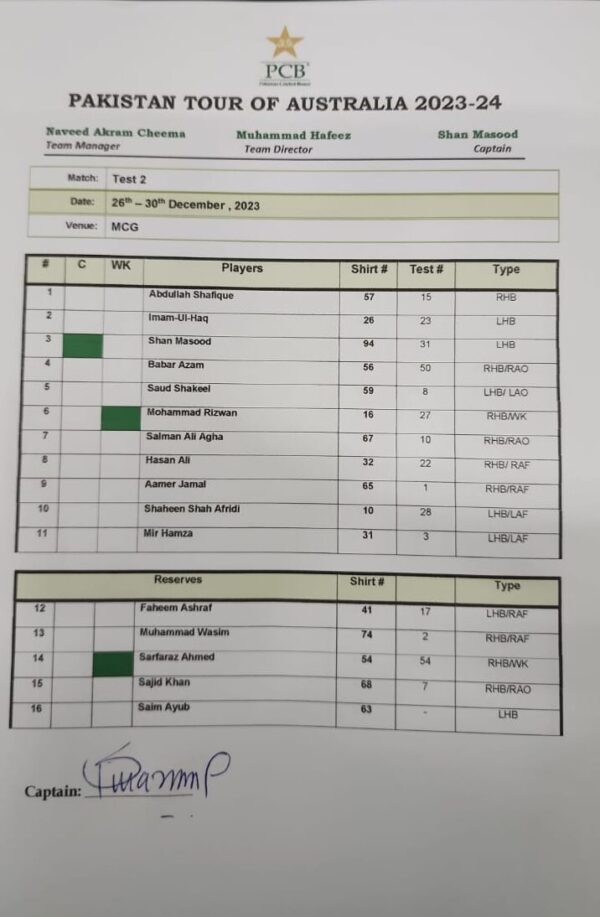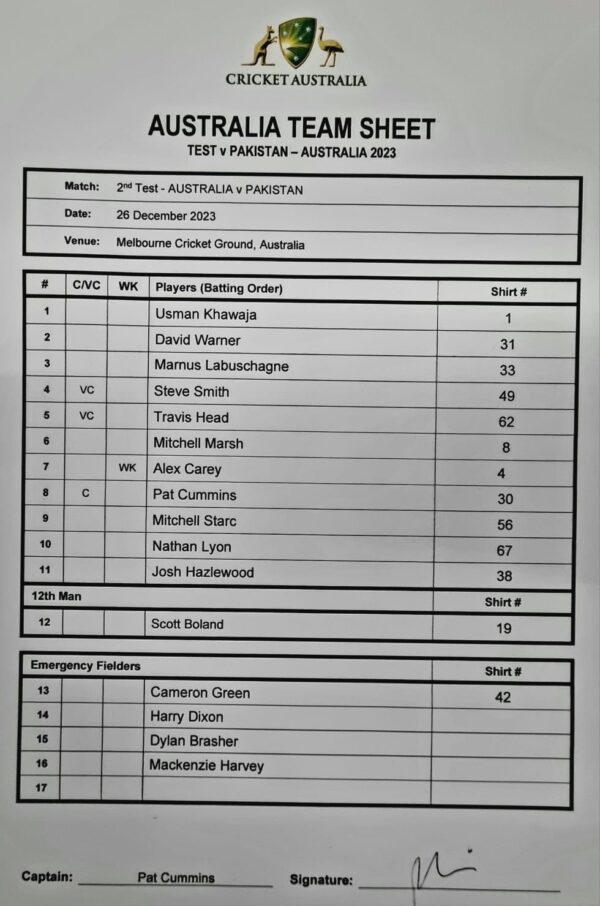Hussey and Larsen to be inducted in the Australian Cricket Hall of Fame

The Australian Cricket Hall of Fame Committee, together with Cricket Australia (CA) and the Australian Cricketers’ Association (ACA), has announced Michael Hussey and Lyn Larsen AM as inductees into the Australian Cricket Hall of Fame.
Hussey and Larsen become the 62nd and 63rd inductees into the Australian Cricket Hall of Fame, established in 1996.
Media Opportunity: Australian Cricket Hall of Fame inductee Michael Hussey and Australian Cricket Hall of Fame Chair Peter King will be available to media this morning at 8.15am AEDT at the Dennis Lillee Statue at the MCG. Lyn Larsen will be available for interviews upon request.
VNR: Click here to download vision and photos of Australian Cricket Hall of Fame inductee Lyn Larsen.
Michael Hussey
Michael Hussey was a prolific batter for Australia and Western Australia and as renowned for his incredible ability to accumulate runs as for his unstinting commitment to the game.
Hussey played 79 Tests making 6235 runs at 51.52 including 19 centuries and 29 half centuries with a top score of 195.

He played 185 One Day Internationals making 5442 runs at 48.15 including three centuries and 39 half centuries with a top score of 109*.
An early adapter to T20 cricket, Hussey played 38 T20 Internationals making 721 runs at 37.94 with a top score of 60* and was a prominent performer in both the BBL and IPL.
Representing Australia, Western Australia, Northamptonshire, Gloucestershire and Durham he played 273 first-class matches making 22,783 runs at 52.13 with 61 centuries and 103 half centuries with a top score of 331*.
From Perth, Hussey served a long and successful first-class apprenticeship with his native Western Australian and Northamptonshire in England for whom he scored two triple centuries before winning the favour of the Australian selectors.
Hussey was 28 when chosen for his One Day International debut against India in 2004 and 30 when he played his first Test against the West Indies in 2005 as a replacement for injured opener Justin Langer.
But he soon made up for lost time scoring centuries in his second and third Test matches in Adelaide and Hobart and he became the fastest player to make 1000 Test runs reaching the milestone in just 166 days.
Hussey’s vast appetite for runs would ensure he was a mainstay of Australian Test and ODI teams regularly rated among the best of all-time and he was a member of the 2007 World Cup winning team.
Since retirement, he has been a batting coach for several national teams, worked as an expert commentator and as a consultant using his expertise to review high-performance cricket programs.
Lyn Larsen
Lyn Larsen was a long-term captain of the Australian Women’s team and an outstanding all-rounder representing Australia in Test and limited overs cricket with distinction between 1984 and 1994.
Larsen played 15 Tests making 410 runs at 41 and including three fifties with a top score of 86 and took 26 wickets at 18.73 with best figures of 4/33.
She played 49 One Day Internationals making 426 runs at 20.28 including two fifties with a top score of 62 and 24 wickets at 31.79 with best figures of 3/19.
From Lismore in northern NSW, Larsen represented NSW County as a 14-year-old and made her NSW debut in 1980 aged 17. In 1983/84, she was selected to tour India where she made her Test debut.
Appointed Australian captain in 1987 at just 22, Larsen compiled an outstanding record with Australia winning five and drawing five Test matches and winning 29 of the 43 One Day Internationals played under her leadership including the 1988 World Cup.
As skipper, Larsen was renowned for her astute tactics and for her leadership which had a profound influence both on teammates and more broadly on the improved visibility of women’s cricket.
During her captaincy, Larsen served as an Australian selector for three years and upon her retirement from international cricket was team manager of the Australian Youth Team and held roles in coaching and administration including as a member of the SCG Trust.
In 2020 she was honoured with the AM (Order of Australia) for significant services to cricket as a player, selector, manager and coach at the elite level. She was inducted into the Sport Australia Hall of Fame in 1999 and the NSW Cricket Hall of Fame in 2010.
Peter King, Australian Cricket Hall of Fame Chair, said:
“Every inductee into the Australian Cricket Hall of Fame is recognised for their invaluable contribution to the sport, defined by standout performances and outstanding achievements.
“Michael’s reputation as ‘Mr Cricket’ is a solid indication of the impact he had during his career, managing to defy the typical cricketer’s journey, selected to make his Test debut at age 30.
“His leadership and commitment to the game, to his teammates, and to all of the Australian fans, consolidated his status as one of the greatest Australian batters we have seen.
“Lyn’s induction is reflective of her momentous achievements during what was an esteemed career spanning more than a decade, including her selection as Australian captain when she was just 22 years old.
“Lyn’s imprint on the game has been remarkable, and she has played an instrumental role in boosting the recognition of women’s cricket with one defining highlight being the 1988 World Cup final victory at the MCG.”
Nick Hockley, Cricket Australia CEO, said:
“It is pleasing to see two greats of our game receive such deserved recognition. Michael and Lyn are wonderful contributors to Australian Cricket and sit comfortably alongside their fellow Hall of Fame members.
“The name Michael Hussey is synonymous with the hard work, skill and dedication needed to succeed at the highest level and his inspirational career is testament to the values to which all great players aspire.
“Not only was Lyn a tremendous all-rounder, her exceptional leadership guided the Australian Women’s team throughout a period of enormous success and set a wonderful example for all those who have followed.”
Todd Greenberg, Australian Cricketers’ Association CEO said:
“Through the 1980s and 90s, Lyn Larsen had a transformative impact on Australian women’s cricket, leading by example to help establish Australia as a dominant force in the women’s game – a legacy that endures today.
“Her impact on Australian cricket extended to her role as an Australian selector and manager of the Australian Youth Team, and continues to be a revered figure in her hometown of Lismore and she is a wonderful addition to the Australian Cricket Hall of Fame.
“Mike Hussey is a case study in Aussie persistence, knocking out runs in the Sheffield Shield for ten years before getting a shot at international level.
“Mike was also a prototype of the modern-day cricket, establishing himself in the T20 format by taking 18 off the last over in the 2010 World T20 semi-final against Pakistan, before establishing himself in the IPL, and as an important figure in the nascent BBL and he now rightfully sits alongside other greats of Australian Cricket in the Hall of Fame.”
About the Australian Cricket Hall of Fame
The Australian Cricket Hall of Fame was first proposed by the Melbourne Cricket Club in 1995.
With the support of Cricket Australia and Cricket Victoria, the Hall of Fame was officially opened by the then Prime Minister of Australia, the Honourable John Howard MP in 1996.
The selection philosophy for the hall of fame focuses on the players’ status as sporting legends in addition to their outstanding statistical records.
The selection panel is made up of representatives from all areas of cricket. Chaired by ACHOF Chair Peter King, three former players are joined by the respective CEOs of Cricket Australia and the Australian Cricketers’ Association, along with two representatives from the media.
All inductees must have been retired from international cricket for a minimum of five years to be eligible for selection.
An inaugural group of ten players were inducted in 1996, and a further 53 players have been welcomed since:


HALL OF FAME INDUCTEES
Inducted 1996 – Fred Spofforth, John Blackham, Victor Trumper, Clarrie Grimmett, Bill Ponsford, Sir Donald Bradman, Bill O’Reilly, Keith Miller, Ray Lindwall and Dennis Lillee
Inducted 2000 – Warwick Armstrong, Neil Harvey and Allan Border
Inducted 2001 – Bill Woodfull and Arthur Morris
Inducted 2002 – Stan McCabe and Greg Chappell
Inducted 2003 – Lindsay Hassett and Ian Chappell
Inducted 2004 – Hugh Trumble and Alan Davidson
Inducted 2005 – Clem Hill and Rod Marsh
Inducted 2006 – Monty Noble and Bob Simpson
Inducted 2007 – Charles Macartney and Richie Benaud
Inducted 2008 – George Giffen and Ian Healy
Inducted 2009 – Steve Waugh
Inducted 2010 – Bill Lawry and Graham McKenzie
Inducted 2011 – Mark Taylor and Doug Walters
Inducted 2012 – Shane Warne
Inducted 2013 – Charlie Turner and Glenn McGrath
Inducted 2014 – Mark Waugh and Belinda Clark
Inducted 2015 – Adam Gilchrist and Jack Ryder
Inducted 2016 – Jeff Thomson and Wally Grout
Inducted 2017 – David Boon, Matthew Hayden and Betty Wilson
Inducted 2018 – Norm O’Neill, Ricky Ponting and Karen Rolton
Inducted 2019 – Cathryn Fitzpatrick, Dean Jones and Billy Murdoch
Inducted 2020 – Sharon Tredrea and Craig McDermott
Inducted 2021 – Johnny Mullagh, Merv Hughes and Lisa Sthalekar
Inducted 2022 – Justin Langer and Raelee Thompson
Inducted 2023 – Marg Jennings and Ian Redpath
Inducted 2024 – Michael Hussey and Lyn Larsen
SELECTION PANEL
ACHOF Chair Peter King
Former Test captain Belinda Clark
Former Test captain Mark Taylor
Former Test batsman and former MCC President Paul Sheahan
Australian Cricketers’ Association CEO Todd Greenberg
Cricket Australia CEO Nick Hockley
Media representatives Ben Horne and Greg Baum
ENDS







